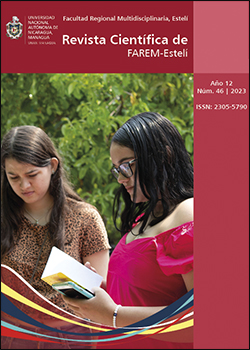The teaching of English through digital platforms at the University of Artemisa, Cuba
DOI:
https://doi.org/10.5377/farem.v12i46.16484Keywords:
Teaching, English, digital platformsAbstract
The use of digital platforms called for a much more active, constructivist and collaborative didactics with the new times. Teachers must develop competencies and skills in students, which meet and respond to their needs to face their social environment, the inclusion of ICTs as an alternative needs more preparation, teachers acknowledge having major deficiencies in relation to training for the didactic use of media and for the design and production of materials, however, it is recognized that despite the uncertainty in the use of digital platforms, the use of ICTs as an alternative needs more preparation, it is recognized that despite the uncertainty, virtual education has renewed the processes of teaching and learning foreign languages, so it is necessary to rethink the didactic-digital strategy and integrate the students in the decision making process in relation to the use of ICTs in their perception of their usefulness, which is why it was proposed as the objective of this research: To demonstrate the development of English language learning through digital platforms in the training of teachers of the career Foreign Languages, English at the University of Artemisa. Theoretical, empirical and statistical-mathematical methods were applied to carry out this research. The contents were oriented to the Moodle platform and asynchronous media. The results showed an advance in the development of the English language since they opened a range of possibilities and encouraged the continuous training of the students involved to achieve the objectives set to the current and future needs. Considering learning as a fundamental axis in education, the teacher’s role is to facilitate these processes to achieve the goals proposed in student education and where students demonstrate creative thinking, build knowledge and develop innovative products and processes using ICTs.
Downloads
References
Bergmann, J. & Sams, A. (2012). Flip your classroom: Reach every student in every class every day. International Society for Technology in Education (ISTE).
Bonilla-Guachamín, J. A. (2020). Las dos caras de la educación en el COVID-19. Revista CienciAmérica, 9 (2).
Cerezal Mezquita, J; Fiallo Rodríguez, J. (2002). Los métodos científicos en las investigaciones pedagógicas. La Habana, Cuba.
Cervantes Cerra, D (2021). En tiempos de pandemia: La enseñanza de lenguas extranjeras en la educación remota. En Revista Boletín Redipe 10(8): 192-212- Agosto 2021 - I S S N 2 2 5 6 - 1 5 3 6.
Del-Prete, A, & Cabero-Almenara, J. (2019). Las plataformas de formación virtual: algunas variables que determinan su utilización. [The learning management system: Variables that determine its use]. Apertura (Guadalajara, Jal.), 11(2), 138-153. https://doi.org/10.32870/ap.v11n2.1521
Fundora, P; Reiné, Y & Rodríguez, L (2022). El desarrollo del idioma Inglés a través del uso de las TICS. https://www.eumed.net/uploads/articulos/1a759853494e96c3ea7405156a91e40e.pdf
Galindo Valero, P (2021). Utilización de plataformas digitales en educación. En Revista de Educación, Innovación y Formación, REIF, 2021, 4, 7-25 (ISSN 2659-8345)
Gallo, J. y González, E. (2000). Introducción a la metodología de la investigación pedagógica y técnica. La Habana.
García, A & Muñiz (2021). Las competencias digitales en el ámbito educativo. https://www.studocu.com/es-mx/document/universidad-autonoma-de-chiapas/tecnologias-de-informacion/ 22988840
Hernández Sampieri, R; Fernández Colado, C y Baptista Luicio, P. (2014). Metodología de la investigación (6ta Ed). México: Mc Graw Hill.
Kerr Taylor, J y Sambola, D (2022). Internet como medio de transformación en el proceso educativo en las comunidades de la Región Autónoma Costa Caribe sur de Nicaragua. Revista Científica de FAREM-Estelí. Año 11 | Núm. 44 | Octubre- diciembre, 2022 | Pág. 24-34.
Lanuez, M.; Martínez Llantada, M.; Pérez Fernández, V. (2008). El maestro y la investigación educativa en el siglo XXI, La Habana.
Medina, E., García, A., Mestre, V., y Ordóñez, M. (2020). Retos de la Universidad de Ciencias Médicas de Matanzas en tiempos de Covid-19. Ed. Educación y Pedagogía. 21.
Moreno, R & Galván, G (2020). Realidad aumentada y realidad virtual para la creación de escenarios de aprendizaje de la legua inglesa desde un enfoque comunicativo. España: Universidad Autónoma de Barcelona. Obtenido de https://ddd.uab.cat/record/226872
Navas, Y; Real, I; Pacheco, S & Mayorga, A (2015). Los Procesos de Enseñanza y Aprendizaje del Idioma Inglés a través de los Entornos Virtuales de Aprendizaje. Ecuador: Revista Ciencia UNEMI.Obtenido de http://repositorio.unemi.edu.ec/bitstream/123456789/3067/1/LOS%20PROCESOS%20DE%20ENSE%c3%91ANZA%20Y%20APRENDIZAJE%20DEL%20IDIOMA%20INGL%c3%89S%20A%20TRAV%c3%89S%20DE%20LOS%20ENTORNOS%20VIRTUALES%20DE%20APRENDIZAJE.pdf
Reiné- Herrera, Y & Fundora- Ramírez, P (2022). Metodología para el desarrollo de una nueva concepción de la competencia la lectodigital. http://atenas.umcc.cu/index.php/atenas/article/view/18/21.
Rodríguez, A. et. al. (2020). Modelo pedagógico acorde con las demandas del siglo XXI para la formación de profesionales en la Universidad de Artemisa. (Informe final en soporte digital)
Ortega, D.; Acosta, C. L. & Ortega, F. (2023) La escuela infinita. Aprender y enseñar en entornos ubicuos. Editorial Pueblo y Educación.
Pastran, M; Gil, N.A. y Cervantes, D. (2020). En tiempos de coronavirus: las TIC´S son una buena alternativa para la educación remota. Revista Boletín Redipe, 9(8), 158–165. https://doi.org/10.36260/rbr. V9i8.1048
Varona, F. (2022). Perspectivas en la utilización de las tecnologías de información y comunicación de la educación superior. Revista Visión Antataura, Vol.6, No.2: 170-184, diciembre 2022-mayo 2023, Panamá, ISSN 2520-9892.
Zilberstein, J (2003). Reflexiones acerca de qué es un resultado científico en la investigación educativa y qué vías son las más propicias para introducirlos. En Revista ICCP.
Published
How to Cite
Issue
Section
License
Copyright (c) 2023 Revista Científica de FAREM-Esteli

This work is licensed under a Creative Commons Attribution-NonCommercial-ShareAlike 4.0 International License.

